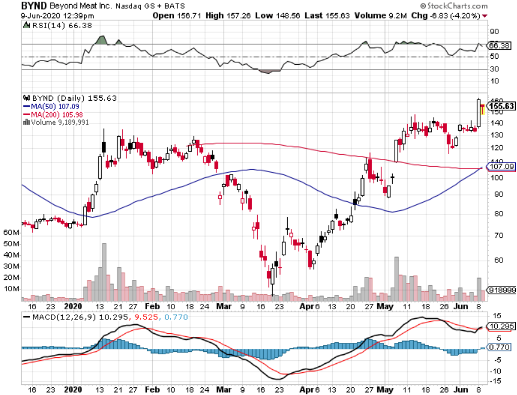The Tailwind Behind Beyond Meat
Over 20,000 meat processing plant workers have contracted Covid-19 resulting in numerous deaths. I will explain why this has been a massive contributor to Beyond Meat’s (BYND) recent overperformance.
The Plant-Based Foods Association reported sales increasing over 90% in the middle of March 2020 from the year prior as animal-based meat shortages pervaded meat supply lines across the U.S.
Beyond Meat is one of the few publicly traded food tech companies out there and have been the recipient of several tailwinds all powering the company’s revenue at one time.
The pandemic has underscored the trend of consumers eating plant-based alternative options as a viable alternative.
It has been one of those trends that have gone viral as consumers simply avoid meat because of a surge in prices caused by a sudden shortage.
The 90% growth of plant-based meat sales in mid-March was followed up by 27% growth in April.
The post-March follow-through leads me to believe that more than a few consumers were satisfied with the products and became repeat purchasers.
Since health has been a do-or-die proposition starting in March, there has been a continued evolvement in consumer purchasing toward natural and organic products that enhance health and immunity.
Not only are plant-based meats getting rewarded, but other categories of health foods have seen explosive growth.
Retail sales of plant-based meat products were higher by nearly 150% during peak panic buying in March and stayed above 50% through late April.
Refrigerated plant-based meat was the hottest-selling product registering a blistering increase in sales of 241% year-over-year during the peak panic buying period.
Plant-based foods have gone from the periphery of the food scene to the vanguard of sustainability and nutrition.
The coronavirus has also shined a light on how well companies treat their workers or the maltreatment of workers.
Meatpacking workers were holed up in tight areas causing a rapid outbreak of the virus which was thoroughly reported in the media and left a bad taste in consumers' mouth.
By the beginning of June, a survey revealed that 52% of respondents believe the food industry should focus more on meat-free foods to help reduce shortages.
The same survey of 1000 people also found that half of respondents don’t agree with the meat industry’s level of care about the health of its workers, and 65% don’t think it cares about the treatment of livestock.
The optics not only looked bad for the workers, but also for the product as the bottleneck in processing also led to the largest pig culling effort the U.S. has ever seen as hundreds of thousands of animals were backed up on farms.
This happened all while 40 million workers lost their jobs and bread lines formed as long as the eye could see in many of the big U.S. cities.
The animal-based meat industry has most likely had its worst-ever first half year to any financial year on record.
Fortunately, Beyond Meat has avoided the fate of the meat industry and is running with the momentum by announcing a partnership with food distributor Sinodis to further deliver products in China.
Sinodis, a subsidiary of French group Savencia, is a distributor of imported food products to more than 4500 wholesalers, restaurant chains, and hotels in China.
The deal fortifies Beyond Meat’s presence in China while supplementing new income streams.
Back in April, Beyond Meat also announced a bevy of new China openings with Starbucks (SBUX) and followed that up with deals with Kentucky Fried Chicken (KFC) and Pizza Hut.
The efforts to widen its customer reach has not gone unnoticed with the stock tripling from virus lows this year.
Ultimately, the adoption of U.S. mainstream customers in the wealthier suburbs will be critical to long-term success.
The company plans to broaden its product line into other forms of substitute meat, like poultry, to grow its top-line revenue.
The stock has more room to run and investors should wait for a dip to put new money to work.
Price action is volatile, meaning investors should buy and hold shares and not try to game the stock short-term.



